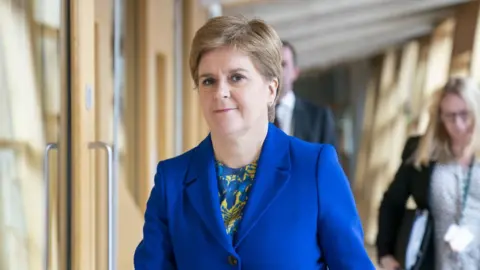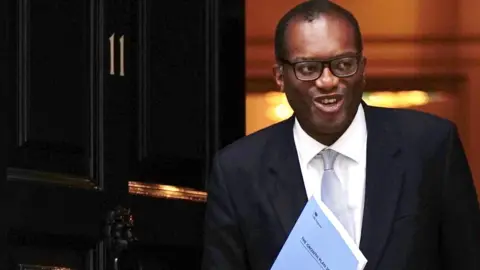Mini-budget: Tax gap between Scotland and England set to widen
 PA Media
PA MediaScotland's first minister has hinted that she is unlikely to match income tax cuts for the highest earners elsewhere in the UK.
Chancellor Kwasi Kwarteng unveiled a cut from 20p to 19p in the basic rate of tax and scrapped the 45p rate for the highest earners in his mini-budget.
The cuts do not apply to Scotland, where income tax rates and bands are decided by the Scottish government.
Ms Sturgeon described the mini-budget as "reckless".
And she said the Chancellor's income tax plans would benefit the wealthiest over poor and middle income earners.
The first minister tweeted: "Yet Tories (and right wing commentators) will demand that Scottish Government blindly follows suit."
The Chancellor's announcement of the biggest tax cuts in the UK for 50 years would potentially mean that people earning more than £150,000 in Scotland will pay income tax at 46% rather than the 40% rate elsewhere in the UK.
The cut in basic rate tax from 20p in the pound to 19p will also not apply in Scotland, where rates have different thresholds.
Mr Kwarteng said his aim was to kickstart a "new era" for the UK economy that would be focused on growth.
The pound sank to a fresh 37-year low as the chancellor gave his statement.
Deputy First Minister John Swinney said the Scottish government would set out its decisions on tax when it outlines its own budget plans later in the year, but would not be drawn on what these decisions are likely to be.
He told BBC Scotland: "The Chancellor has obviously made tax changes today. We will consider those changes and make the right judgements for people in Scotland.
"We want to make sure that we do the right thing by people, by our public services and by our economy and will set out our stance in light of the decisions made by the Chancellor when it comes to establishing our budgets for the forthcoming year."
Mr Swinney, who is acting as finance secretary while Kate Forbes is on maternity leave, will also need to decide how to respond to the Chancellor announcing that people buying properties worth up to £250,000 will no longer need to pay stamp duty.
House buyers in Scotland currently have to pay the Scottish equivalent of stamp duty - Land and Buildings Transactions Tax - on properties worth over £140,000.
 PA Media
PA MediaHowever, Scottish businesses will benefit from the scrapping of a planned rise in corporation tax from 19% to 25%.
And a 1.25% rise in National Insurance will also be reversed across the UK from 6 November - which the UK government said would save 2.3 million Scottish workers an average of £285 a year.
The UK government will also look to work with the Scottish government and local authorities to set up Investment Zones in Scotland, which will offer tax cuts for businesses and more relaxed planning rules to release more land for housing and commercial development.
Meanwhile, Scotch whisky distillers and brewers will benefit from an end to planned reforms of alcohol duty, and retailers will hope to be boosted by a new system of VAT-free shopping for foreign tourists.
Scottish Secretary Alister Jack said the Chancellor's plans - which also include lifting a limit on bonuses for bankers - would mean an additional £630m for the Scottish government's budget over the next three years.
Mr Jack added: "The Chancellor has set out an ambitious package of measures which will cut taxes and drive growth right across the UK.
"A strong economy is the best way to tackle the cost of living challenges we are all facing due to Russia's invasion of Ukraine.
"Our 'Plan for Growth' will support households and businesses in Scotland, while driving economic growth to deliver jobs, investment and prosperity."
Scottish Labour leader Anas Sarwar described the Chancellor's statement as "economically illiterate and morally bankrupt"
Mr Sarwar said: "They have lifted the cap on bankers bonuses, given a tax cut to those at the very top, and delivered a windfall instead of a windfall tax for the energy giants making record profits - all while letting energy prices almost double and working people struggle to make ends meet."


John Swinney described the Chancellor's tax cuts and borrowing as reckless and that it represented 12 years of Tory failure.
Everyone's anxious to know if the tax cuts will be replicated here, in our devolved settlement.
But Mr Swinney was inscrutable - merely saying the Government will look carefully at their tax position in light of the changes and that it would be set out in an orderly fashion.
The SNP are frequently taunted in the House of Commons that Scotland's the highest taxed part of the UK - but Mr Swinney said most people in Scotland pay less in taxation than they would if they did in England.
One note that chimes with the Chancellor, the government in Edinburgh will engage with the UK Government on investment zones.
Overall, the two governments are going in different directions with the Deputy First Minister leading to the point that independence is the natural conclusion.
Questioned about prosperity and stability under independence, John Swinney said the UK is not a good example of fiscal stability.
So, from leafy Perthshire to Gothic Westminster, it's clear there's a huge divergence of approach now.
